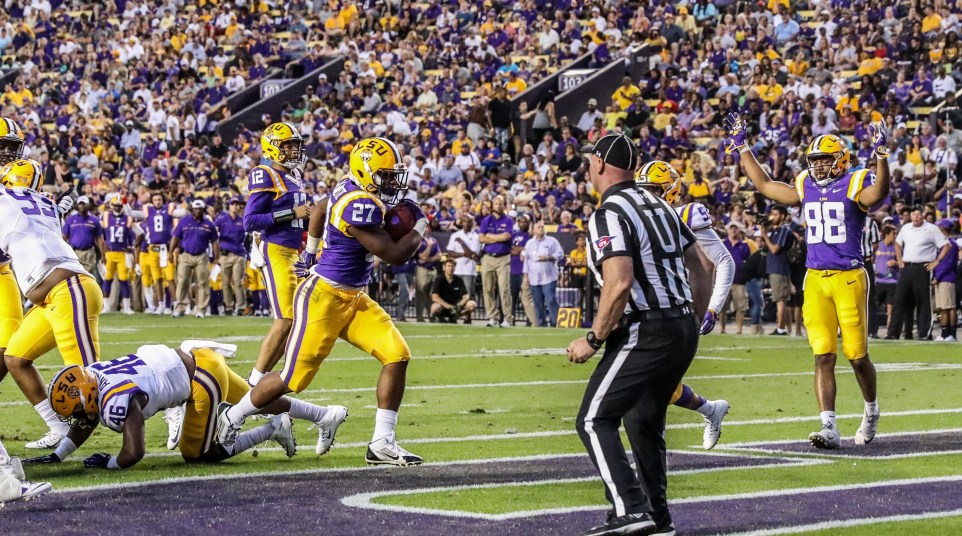
Grading LSU's post-spring strengths and weaknesses
BATON ROUGE, LA. — With the Tigers’ spring practice and the 2017 NFL Draft in the books, LSU’s focus turns to the program’s outlook heading into the summer.
The defense made a statement in the shortened preview in the National L Club Spring Game, leaving questions surrounding the offense under the leadership of first-year coordinator Matt Canada.
Heading into the hot, humid summer days without football, let’s take a look at the Tigers’ strengths and weaknesses coming out the spring.
Strengths
Secondary: Despite losing two first-round draft picks, the Tigers’ secondary under the leadership of defensive backs coach Corey Raymond continues to reload. Senior safety John Battle and senior converted safety Ed Paris took on the leadership roles left in the wake of safety Jamal Adams and cornerback Tre’Davious White’s departure to the next level.
Kevin Toliver II appeared to return to his freshman All-American form after battling injuries throughout a rough sophomore campaign in 2016. The early-enrollee safety duo of JaCoby Stevens and Grant Delpit adapted well to the speed of the game throughout the spring, according to veterans in the secondary.
Delpit showed flashes of excellence in the spring game, posting four tackles, including a tackle for loss, and one pass breakup.
In other words, LSU continues to churn out and replace defensive backs with the best in the country.
Offensive playmakers: Junior running back Derrius Guice and senior wide receiver D.J. Chark were the proven playmakers entering spring. Help is on the way. Throughout the spring, Chark raved about the depth of the receiving corps behind him, but the wideouts provided no “wow” moments in the shortened spring game.
While the receivers struggled, the running backs behind Guice recorded more success. Junior running back Nick Brossette, a former 4-star recruit out of University High School in Baton Rouge, averaged 8.7 yards per carry. Sophomore running back Lanard Fournette, the younger brother of Leonard, broke free for a 19-yard run. Despite the duo’s limited playing experience, the Tigers revealed addition talent in the backfield.
Defensive depth: Defensive coordinator Dave Aranda answered some major depth questions in the spring beyond the secondary. After losing Kendell Beckwith and Duke Riley to the NFL, linebacker depth was a major question.
Sophomore Devin White’s breakout spring game showed his potential as one of the Tigers’ next star linebackers.
The highly recruited freshmen trio of K’Lavon Chaisson, Jacob Phillips and Patrick Queen will further fill the void when they arrive this summer. While White made a mark in the spring game, LSU coach Ed Orgeron’s announcement of junior linebacker/defensive end Arden Key’s expected return to the team before the start of LSU’s summer session (beginning June 5) should end any panic around defensive line depth and how the Tigers are going to replace his 12 sacks, 14.5 tackles for loss and 11 quarterback pressures from last season.
Weaknesses
Quarterbacks: Despite the outside perception that senior quarterback Danny Etling is the Tigers’ clear-cut starter, Orgeron declared the competition open with no one quarterback separating himself after the spring game.
Etling didn’t help himself in the spring game. He went 4-of-11 for 53 yards with an interception. Days later, Etling had a “minor surgery” on his back, which likely affected his performance, Orgeron told The Advocate. He will resume throwing within six weeks and will be ready for the start of fall camp.
Although his rehab will not interfere with summer practice, it might impact Etling’s individual summer goal of improving his mechanics after focusing on installing Matt Canada’s new offense in the spring. Etling is still the presumed starter, however the quarterback conversation may heat up during the summer with the arrival of highly-touted freshman Myles Brennan.
Special teams: Although not precisely a weakness, Orgeron’s special teams revamp remains a complete mystery after the spring. The spring game featured drills with just the kicker/punter and the return man on the field. Orgeron explained after the game, “We have a new kicking scheme, and I didn’t want to show anything that (other teams) don’t know about.”
The NCAA’s approval of the addition of a 10th assistant coach in college football for the 2018 season doesn’t help the Tigers, who for this season will be without a special teams coordinator. According to NOLA.com, special teams consultant Greg McMahon will direct that group.
The Tigers’ special teams under former LSU coach Les Miles showcased their game-changing potential in many ways, ranging from fake field goals to momentum-shifting hits on special teams coverage. The Tigers’ look to continue the tradition under Orgeron.
Matt Canada’s “work in progress” offense: The debut of Canada’s offense didn’t go as planned, to say the least. Despite showing the most offensive creativity displayed by an LSU offense in the past decade in a single possession, effective results eluded the Tigers in their only public preview this spring.
Etling’s injury no doubt played a part, and Canada couldn’t game plan against Aranda’s defense. Most important, Canada’s use of his playmakers, particularly Guice and Chark, displayed glimpses of a dynamic offense with the potential to make opposing defenses look silly come September.
